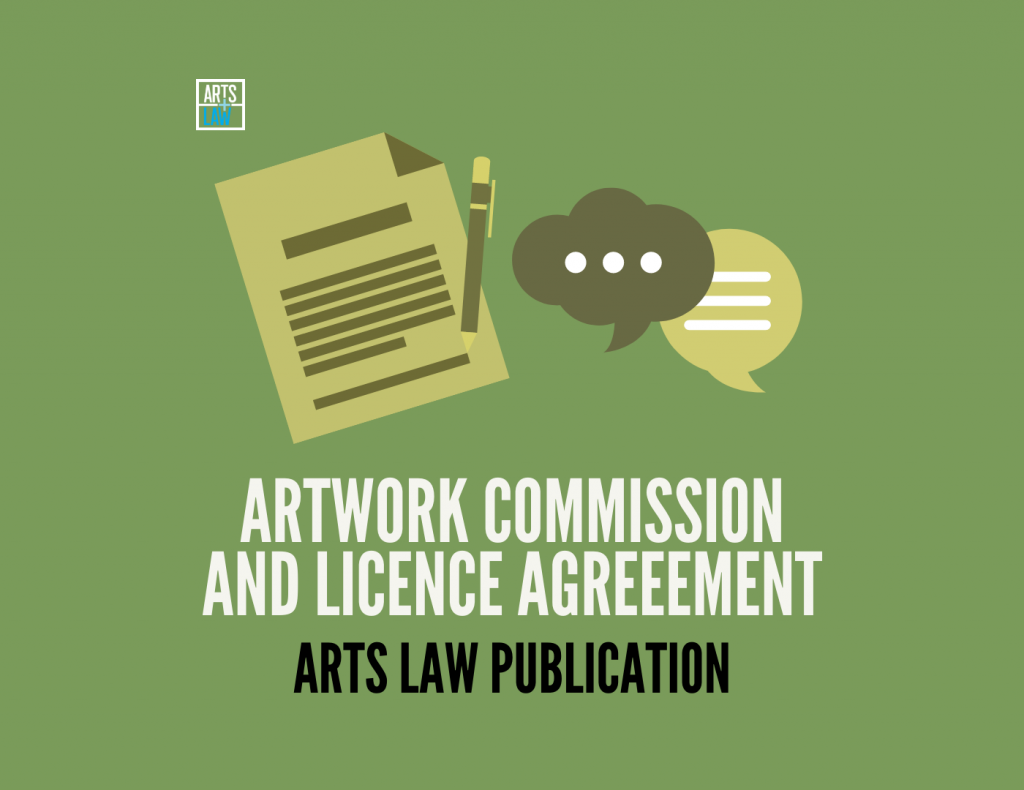Commission VS Licence. Arts Law can help you do both.

Does someone want to commission your work?
Do you need a licence and how are they different?
Arts Law has published a new contract template for artists who are being commissioned to create an artwork, and the commissioner wants to reproduce and communicate the artwork. This can apply to digital or physical works. The commissioner may want the rights to be able to use the work by putting it on merchandise or publishing it on the cover of a publication.
If you’re the creator of the work and you own the copyright, the commissioner will need a licence to be able to use your work in that way. This contract template includes details of both the commission and a licence for the commissioner.
Some examples when this contract can come in handy includes where the commissioner (an individual or a business) asks an artist to create a new artwork so they can use it:
- in their annual report or reconciliation action plan; or
- to apply to merchandise (such as t shirts, tote bags or other merchandise).
The contract has different options for payment to the artist. These include upfront payment, payment according to milestones, royalties or a combination of these. There is also an option for selling a physical version of the artwork to the commissioner for example a canvas.
Things to think about when you’re being commissioned
Did you know that when an artist is commissioned to create an artistic work, as the creator, generally the artist will still retain the copyright? The sale of an artwork transfers ownership of the physical artwork from the artist to the commissioner but the commissioner does not automatically get the right to exercise the copyright.
Copyright owners have the exclusive right to deal with the artwork in the following ways:
- reproduce/ make copies of;
- publish for the first time( (supply reproductions to the public by sale or otherwise; excludes exhibiting an artistic work)
- communicate to the public((make available online or transmit electronically, eg by broadcasting, email or on the internet)
There are some exceptions to this for example:
- Implied copyright licence — Artists should understand that while a commissioner does not automatically get their copyright, what the commissioner usually gets is an implied copyright licence from the artist to use the work for the purpose for which it was commissioned. So, if for example you are commissioned to create artwork for use on cushions, then the commissioner can use the artwork on the cushions. However, the commissioner would not be able to use it for any purposes beyond that, for example on tea towels, without the artist’s permission.
- If a person pays (ie commissions) someone else to take a photograph for a private or domestic purpose (eg wedding photographs), or to paint/draw a portrait, or to make an engraving. In these cases, the commissioner owns copyright in the commissioned work.
- If the creator of an artistic work is an employee, then the employer would own the copyright in the work.
Other useful resources
Arts Law has a Commissioning Agreement – Private or Commercial Visual Artwork which should be used where an artist is commissioned to create a new work however is not granting the commissioner any rights to reproduce and communicate the artwork.
If an artist has already created an artwork and a person or business wants to reproduce or communicate it, the Arts Law Copyright Licensing Agreement would be more appropriate to use.
Arts Law always recommends you have a lawyer look over your finished contract to check if the terms are fair and cover you for what you need. If you would like Arts Law to review your contract submit your details here.

